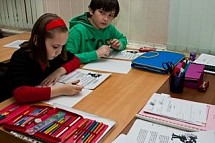Занятия английским языком для школьников
Work on language learning for elementary school focused on learning proper English pronunciation, the correct use of words, the development of the ability to hear and understand spoken language, the development of oral and written skills, developing the ability to read, while enjoying the reading process.
& Nbsp; & Nbsp; During training students enjoy conversational English, conversational phrases and frequently used expressions. Improving English language, they separately pay attention to grammar, the differences between British and American English and the correct pronunciation of words .

The purpose of learning English for students:
- enriching vocabulary;
- natural language understanding, its shape, structure;
- Removing language barriers;
- adaptation to the culture of the language;
- the development of communication skills;
- improving conversational practice;
- the pronunciation correction.
for Education program:
English language program for elementary school is built on the development of communication skills that the child is ready to communicate in new and unexpected situations. Such a system is effective and allows you to quickly memorize the material.
The technique is based on a multi-level system. Form of employment, duration of the program, the program, the selection of teaching materials based on the individual student abilities. Before the start of classes conducted interviews to determine the degree of readiness, language proficiency.
- 1 level. Vocabulary, sound production, mastering grammar, sentence structure skills. Ability to talk about family, home, weather, food and sports. Students can describe the action at the moment, to take part in the slow short dialogues;
- 2 level. Securing skills of pronunciation, reading. The ability to tell us about yourself, the house, navigate the city, explained in public, to ask for help, advice. Understanding the spoken language, listening to dialogues, interviews, news excerpts. Children can talk about how they love to do, to express his opinion, highlight the general sense;
- 3rd level. The development of written language, performing tasks on writing letters, stories, essays, descriptions, locations, reviews. The development of communication skills, preparation of dialogues in a standard situation. The ability to carry on a conversation on the topic of interest, share information;
- 4 level. Performing tasks on reporting, messages, advertisements. The development of narrative skills in a particular genre, speaking in unusual situations when it is necessary to improvise. Work with sources of information, the ability to express surprise, complaint, concern;
- 5 level. The skills of reading and listening to a large volume of information. Speaking with the ability to hold discussions, make predictions, to defend its position. Language becomes naturalness, diversity, emotional tone. Possession of all aspects of the written language.
training mode:
The training exercises are regularly conducted independent, allowing teachers to assess the rate of assimilation of the material, the progress of each student. Classes are held individually. The student can choose the most convenient mode of teaching:
- 2-3 times a week;
- lessons in a vacation.






